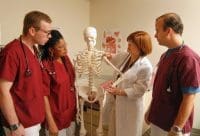“The tassel is worth the hassle” reads the inscription on a card I recently purchased for a college graduate. Unfortunately, for the first time in many years, new graduate nurses may find graduation to be a melancholy event.
Because of recurrent shortages, nurses have become used to the job security and wide range of opportunities available to them. Most nurses could pick their employer, specialty, hours, and sometimes their compensation package. Jobs were plentiful almost everywhere. But today, new nurses are finding that healthcare organizations, like other organizations, are shrinking the number of available positions while bracing for an economic comeback.
Don’t get me wrong. There are jobs available. But new graduates face decisions that nurses have not had to make in many years—decisions about whether they should relocate, whether they should settle for a position outside their chosen practice area, and whether they should accept less compensation or fewer benefits than they expected. Some new graduates are disappointed, frustrated, and angry.
Unsolved shortage
A potential risk facing health care is that the current stabilization of the nursing workforce will be mistaken for a resolution of the nursing shortage. Hospitals and other organizations are downsizing to meet the current decreasing demand for elective services. Some nurses are delaying retirement, and others are going from part time to full time. These trends may create a false sense of equilibrium. But we still need nursing faculty and replacements for the nurses who will retire when they can no longer meet the physical demands of nursing.
During previous periods of economic uncertainty, organizations trimmed payroll, reassigning work to nurses and others. These periods of retrenchment were short, and the demand for nurses rebounded.
In the 1990s after enrollments declined, efforts focused on rekindling interest in nursing as a career. Public-private partnerships created programs to encourage teens to choose nursing. And schools of nursing developed innovative entry programs to increase the pool of nurses. Undoubtedly, we dangled the promise of a secure future in front of these recruits. But we were being honest. Even in the worst of times, the job market offers opportunities for nurses. However, in tough economic times, new and experienced nurses need to seek a job—not just select one.
More education
Today, the employers are doing the selecting, and they are selecting nurses with more education. So the time is right for nurses to advance their education, whether the next step is a bachelor’s, master’s, or doctoral degree.
For new grads, the right move may be seeking employment where there’s an established residency program. Mounting evidence shows the benefits of new graduate residency programs, and two major initiatives are focused on formalizing the need for and legitimacy of these offerings. The National Council of State Boards of Nursing is proposing a “Transition to Practice Model” that would require a preceptor experience and online learning. After 1 year of practice, the new graduate will be expected to meet Quality and Safety Education for Nurses competencies and submit a written verification of “transition to practice” to maintain licensure. The Commission on Collegiate Nursing Education launched its program to accredit transition into practice programs for post-baccalaureate nurse residencies in March of this year.
Long-term perspective
When I graduated at the cusp of an impending nurse shortage, I thought I had the world by the tail. I probably did. I was lucky enough to graduate in a period of high demand.
Let’s help our newest colleagues today adapt to the changing landscape of employment. Provide advice, steer them to new opportunities, and help them put these challenging times into perspective. We want to preserve the future generations of nurses and have a healthy pipeline of students pursuing nursing as a career. They are our seed corn. We must protect them from discouragement, support them with hope, and share our wisdom that things will get better—they always do.
Pamela F. Cipriano, PhD, RN, FAAN, NEA-BC
Editor-in-Chief


















